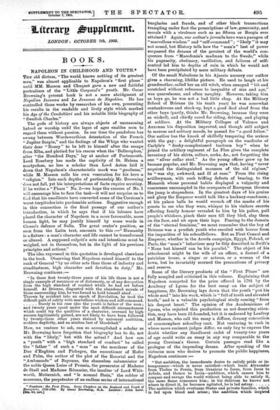querors from " Macedonia's madman to the Swede," while his
pugnacity, obstinacy, vacillation, and failures of self- control led him to depths of ruin in which he would not have been precipitated by mere military defeats.
Of the small Nabulione in his Ajaccio nursery our author gives a charming, lifelike picture. He used to-laugh at his grandmother, called her an old witch, when annoyed "bit and scratched without reference to inequality of size and age," was quarrelsome, and often naughty. However, taking him as boys go, be was not a bad little chap. At the Military School of Brienne (in his tenth year) he was somewhat cantankerous and stuck-up, kept a good deal aloof from the other boys (partly, thinks Mr. Browning, because they were so wicked), and chiefly cared for riding, driving, and playing at soldiers. At the Military Colleges of Valence and Auxonne his disposition improved, and though still subject to morose and solitary moods, he passed for "a good fellow."
Our author has the knack of skilfully tempering the serious with the gay : a delightful paragraph on the wardrobe of Carlyle's "dusky-complexioned taciturn boy" when he
joined the artillery regiment of La Fere gives the complete inventory of his shirts, collars, socks, &e., not forgetting the one "silver collar stud." As the young officer grew up he became popular, and Mr. Browning says that, having "never acquired the distinguished manners of the old regime," he "was shy, awkward, and ill at ease." From the rising artilleryman, with such trifling defects of bearing, to the Monarch whose personal habits displayed a vulgarity and coarseness unexampled in the occupants of European thrones the jump is stupendous. In the greatest days of his genius and glory the Emperor would talk like a hackney-coachman ; at his palace balls he would wrench off the masks of his guests to see who they were, whisper to his visitors secrets affecting family honour revealed to him by his police, pull


























































 Previous page
Previous page